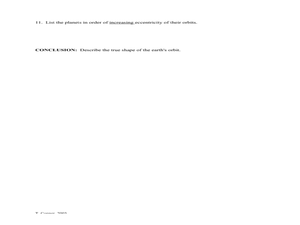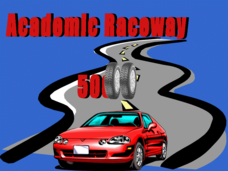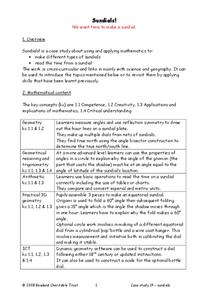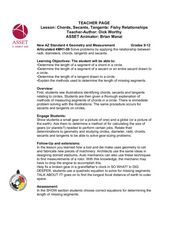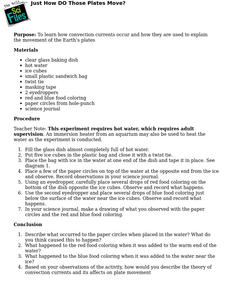Curated OER
Why Do We Have Seasons?
First graders watch a video about the seasons. They role play with the teacher the sun and earth. The student's heads are the earth, their foreheads are the Northern Hemisphere. The teacher shines a flashlight on them to simulate the sun...
Star Date
Modeling the Night Sky
Dramatize the stars and planets as they become a visual representation of the solar system in this activity. Young astronomers track and simulate various constellations as they orbit the Earth to learn the position and motion of...
Novelinks
The Hitchhiker’s Guide to the Galaxy: Concept Analysis
Considering using Douglas Adams' The Hitchhiker's Guide to the Galaxy as a whole class reading or for book circles? Check out this overview that provides a plot summary, a list of enduring questions raise by and themes addressed by the...
Curated OER
Ellipse Lab
Leading the students to draw a representation of ellipses of planets, this handout will help understanding the planet movement around the sun. There are ten questions about the analysis of those orbits and a conclusino specifically...
Curated OER
Proper Nouns
Use this worksheet to help your class identify proper nouns. They circle the proper nouns in 16 sentences. Answer key is provided.
Teach Engineering
The Great Gravity Escape
Groups simulate an orbit using a piece of string and a water balloon. Individuals spin in a circular path and calculate the balloon's velocity when the clothes pin can no longer hold onto the balloon.
Weber State University
The Sun and the Seasons
Why is there more daylight in June than in December if you live above the equator? How does the angle of sunlight shift throughout the year? Answer these questions and more with an interactive article about the sun, its path through the...
NOAA
The Biogeochemical Cycle
The biogeochemical cycle ... no physics? The fourth installment of a 23-part NOAA Enrichment in Marine sciences and Oceanography (NEMO) program introduces the biogeochemical cycle by having pupils simulate movement between Earth's...
Curated OER
Academic Raceway: Animals
Race to the finish line with this interactive PowerPoint! Students must answer multiple choice questions about animals to get to the Winners' Circle. Tip: Have students play individually until they can get all of the questions correct.
Bowland
Sundials!
Time to learn about sundials. Scholars see how to build sundials after learning about Earth's rotation and its relation to time. The unit describes several different types of possible sundials, so choose the one that fits your needs — or...
University of California
Energy and Biomass Pyramids
Young scientists play tag as they act out the food pyramid in the ocean ecosystem. Energy circles pass from the smaller prey to the predators and at the end of the activity, a data chart and analysis questions allow pupils to apply their...
K5 Learning
Why Does the Ocean have Waves?
Six short answer questions challenge scholars to show what they know after reading an informational text that examines waves—what they are, what causes them, and how different Earth factors affect their size and strength.
Curated OER
Clowning Around: Drawing
Kids create a clown out of shapes. They work to show emotions while practicing their drawing skills. Pupils use circles, triangles, squares, oil pastels, and their imagination to draw, color, and decorate a sad or happy clown. Tip: Have...
Curated OER
El Niño ~ The Return of El Niño
El Niño sure creates a stir when it comes around! Why not stir up your earth science class with this data analysis activity that examines the temperature and precipitation over the 2002-2003 water year. A tracking chart is provided...
Colorado State University
What Is a "Convection Cell"?
Round and round in circles it goes! A hands-on activity has learners recreate a model of a convection cell. They watch as the difference in density of their materials creates a current.
The Big Read
The Grapes of Wrath - Discussion & Writing Activities
Add a great resource to your collection of The Grapes of Wrath curriculum materials. A thorough packet contains loads of useful suggestions, whether you use the novel as an anchor text, as a reading circle...
NOAA
Currents
A deep ocean current circles the globe at a force that is greater than 16 times all the world's rivers combined. Groups analyze the effects of submarine topography on deep ocean current speed. They then determine how this speed affects...
Curated OER
Soaring Through Space With a Kid Pix Slide Show
First graders create a slide show on Kid Pix about space. In this space lesson plan, 1st graders will explore the earth, sun, moon, and planets. After exploring their motions and locations around the sun, they create a 4 page slide show...
Curated OER
Chors, Secants, Tangents
High schoolers identify the relationship between chords, secants and circles. In this geometry lesson plan, students calculate the length of the chords. They sketch the secant lines on a circle.
Curated OER
Just How DO Those Plates Move?
Students experiment with water, temperature and paper to explore how convection currents occur and how they are used to explain the movement of the Earth's plates.
Curated OER
Seasonal CEENBoT
Learners simulate the Earth's revolution around the sun using CEENBoT. In this earth science lesson students calculate the Earth's distance in AU and it's speed of revolution. They explain how the Earth's movement cause seasonal variation.
Curated OER
Distance Makes a Difference
Middle schoolers create a clay model of the Sun and Earth. In this space science lesson, students explain how distance affects the appearance of objects. They write a poem or riddle about the Sun in their journal.
Curated OER
Measuring the Earth (Eratoshenes' method)
Sixth graders engage in problem solving, communicating, reasoning, and connecting to represent and solve problems, using geometric models.
Curated OER
Heat Transfer
In this heat transfer worksheet, students observe photographs of the various ways heat is transferred. Included is a radiator giving off heat that rises and cools as it settles, the sun radiating heat to the earth and a house absorbing...



